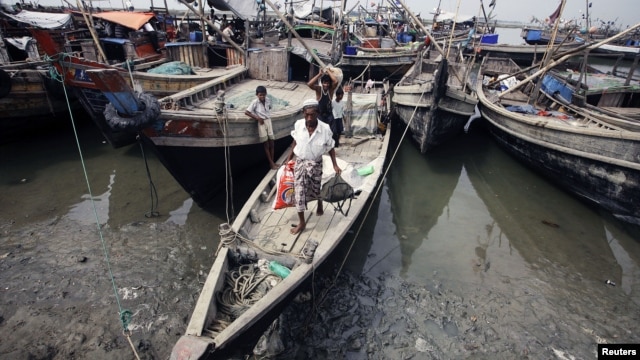Source VOA, 13 Nov
Burmeese displaced by recent violence carry their belongings as they arrive by boats to Thaechaung refugee camp, outside of Sittwe (formerly Akyab), the capital of Rakhine State, October 28, 2012.
GENEVA — The U.N. refugee agency is calling on countries in Southeast Asia to open their borders to people fleeing insecurity and violence in Burma. The UNHCR said it is seriously concerned by the recent drowning of Rohingya Muslims who fled by boat from Burma's Rakhine state in search of a safe haven.
In the last two weeks, two boats reportedly sank in the Bay of Bengal with an estimated 240 people aboard. The U.N. refugee agency said Rohingyas from Burma's Rakhine state were among them.
UNHCR spokeswoman Melissa Fleming saida Bangladeshi naval patrol and fishermen reportedly rescued 40 people from the sinking vessels. "People saw bodies floating in the water, so that does lead us to believe that the fate of those remaining 200 is not good," said Fleming.
"These two incidents mark an alarming start to the traditional sailing season … boating season in the Bay of Bengal, when a mix of asylum seekers and irregular migrants risk their lives on fishing boats in the hope of seeking safety and a better life in Southeast Asia," she added.
An estimated 7,000-8,000 people left Burma via the Bay of Bengal during the previous sailing season from October 2011 to March 2012. The UNHCR said it fears many more could follow in the coming weeks because of escalating tension between the Buddhist-majority Rakhine and minority Muslim Rohingyas in Rakhine State.
Inter-communal violence broke out in June. This was exacerbated in October by renewed ethnic fighting, which killed dozens of people, destroyed thousands of homes and displaced more than 110,000 people.
Fleming said the UNHCR fears that many Rohingyas, driven by desperation, hopelessness and fear, could risk their lives by crossing the Bay of Bengal in un-seaworthy craft.
"UNHCR is urging the government of Myanmar to take urgent action to address some of the main, what we call, push-factors - the factors that are driving people [to flee]," Fleming said.
"These issues are also connected with the problem of citizenship and statelessness in relation to the Rohingyas. … There is a fragile calm that has returned, but tensions remain very high and there is lots of fear that the violence could explode again," she added.
The Muslim Rohingyas have lived in Burma for generations, but have never been granted citizenship. They remain stateless and deprived of all rights and benefits available to Burmese citizens.
UNHCR's Fleming calls this situation unsustainable. Burma is in the world's spotlight right now, she says, and with the advent of a new government and the engagement of Nobel laureate Aung San Su Kyi, there is now a sense of hope that this long-standing issue could finally be resolved.
In the last two weeks, two boats reportedly sank in the Bay of Bengal with an estimated 240 people aboard. The U.N. refugee agency said Rohingyas from Burma's Rakhine state were among them.
UNHCR spokeswoman Melissa Fleming saida Bangladeshi naval patrol and fishermen reportedly rescued 40 people from the sinking vessels. "People saw bodies floating in the water, so that does lead us to believe that the fate of those remaining 200 is not good," said Fleming.
"These two incidents mark an alarming start to the traditional sailing season … boating season in the Bay of Bengal, when a mix of asylum seekers and irregular migrants risk their lives on fishing boats in the hope of seeking safety and a better life in Southeast Asia," she added.
An estimated 7,000-8,000 people left Burma via the Bay of Bengal during the previous sailing season from October 2011 to March 2012. The UNHCR said it fears many more could follow in the coming weeks because of escalating tension between the Buddhist-majority Rakhine and minority Muslim Rohingyas in Rakhine State.
Inter-communal violence broke out in June. This was exacerbated in October by renewed ethnic fighting, which killed dozens of people, destroyed thousands of homes and displaced more than 110,000 people.
Fleming said the UNHCR fears that many Rohingyas, driven by desperation, hopelessness and fear, could risk their lives by crossing the Bay of Bengal in un-seaworthy craft.
"UNHCR is urging the government of Myanmar to take urgent action to address some of the main, what we call, push-factors - the factors that are driving people [to flee]," Fleming said.
"These issues are also connected with the problem of citizenship and statelessness in relation to the Rohingyas. … There is a fragile calm that has returned, but tensions remain very high and there is lots of fear that the violence could explode again," she added.
The Muslim Rohingyas have lived in Burma for generations, but have never been granted citizenship. They remain stateless and deprived of all rights and benefits available to Burmese citizens.
UNHCR's Fleming calls this situation unsustainable. Burma is in the world's spotlight right now, she says, and with the advent of a new government and the engagement of Nobel laureate Aung San Su Kyi, there is now a sense of hope that this long-standing issue could finally be resolved.


No comments:
Post a Comment